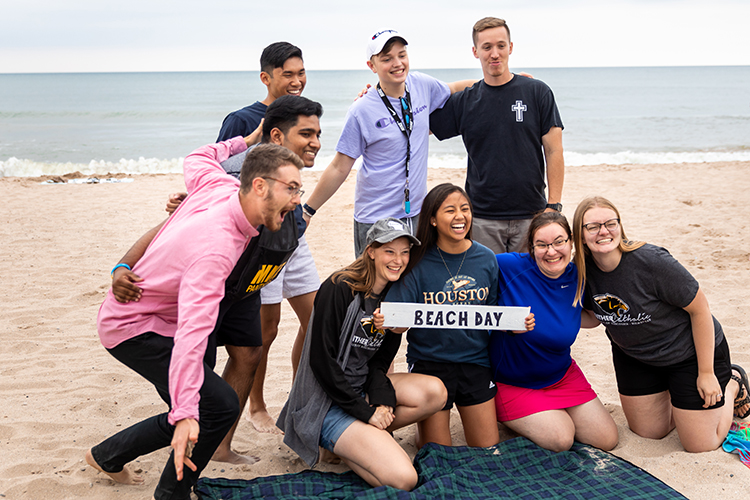
A visit to Bradford Beach was one of dozens of events during Fall Welcome where students could have fun and meet other students as they returned to the campus, many for the first time since the pandemic struck. (UWM Photo/Elora Hennessey)
Rachel Comande spent last year at UWM caught in a two-step dance between attending classes in her suite in Sandburg Residence Hall and her bedroom back home. Gone were the crowded lecture halls and bustling student union she remembered from her first fall semester.
As the COVID-19 pandemic pushed social events and classes online, Comande sat in front of her computer for hours each day, alone. But now, as the Fall 2021 semester gets underway, Comande is enjoying the return of a more in-person learning approach for her third year at UWM.
“I am thrilled to be returning to in-person classes at UWM,” said Comande, who’s pursuing a Digital Arts and Culture degree. “Online classes, especially asynchronous options, could sometimes feel quite isolating. There’s a certain energy that comes from learning in a room with others that pushes you to do better and helps you to learn more.”
The beginning of the fall semester marks a return to campus life not seen since the pandemic began. However, the return of in-person classes does not mean things will return to exactly as they were pre-pandemic.
“We understand that the last nearly year and a half have been really challenging, and that returning to campus will be, for some, full of excitement and apprehension,” said Adam Jussel, the UWM dean of students. “The reality is that we have collectively gone through a moment of historical proportions in this pandemic, and as cliché as it sounds, we are returning to a ‘new normal’ as a campus.”
Like Comande, Megan Biesmann, a third-year atmospheric science major, is ready to return to in-person learning and experience a greater sense of campus community. Although Biesmann wants to get back to the classroom, she is anxious about what this year could bring.
“I am so excited to go back because online classes are harder and more isolating,” Biesmann said. “But I am scared that things could all go back to being all virtual, and I’m not fully sure how everything is going to work.”
Ensuring students’ well-being
UWM administrators have listened to students and are working to ensure students’ well-being as they return to campus, Jussel said.
Informal dialogues for students, faculty and staff will be held over Microsoft Teams to help members of the UWM community process and share feelings and experiences about the pandemic. The next dialogue will be held Sept. 15 from 4 to 5 p.m.
Resources will be available to support students as they navigate the new semester and the pandemic. Well-being programs that encourage mindfulness, building community and connecting to nature are scheduled throughout the fall. One-on-one counseling and group workshops are offered to students through Norris Health Center. And there are spaces on campus where students can meditate or just take respite from the tumult of campus life, including Library E275.
On its Campus Cares webpage, the Dean of Students office also lists both in-person and virtual resources to support mental, physical, emotional and spiritual health.
“We hope that this provides students can connect with each other and rebuild that community and connection to UWM,” Jussel said.
Mindfulness and other activities
Students also can attend activities not centered specifically around wellness, such as the Mindfulness in Nature program and UWMindfuless Moment, as well as excursions to the Milwaukee County Zoo and a city tour, as a part of Fall Welcome. The events are designed to introduce students to Milwaukee and campus and help them feel connected to the greater UWM community.
In addition to organizing self-care and community building events, UWM administrators have created programs to raise awareness of the impact the pandemic has had on students. Faculty and staff have been attending trauma informed care workshops, which will continue during the school year. (Students can attend the workshops as well.) The workshops give attendees tools to identify and support those dealing with trauma of the pandemic.
“Some students have lost friends and family,” Jussel said. “Others lost jobs, and were isolated from those they care about, and we want to acknowledge that. We’re not trying to go back to a pre-pandemic normal. We are trying to create to return to a new, different normal.”
Jussel and other UWM administrators hope the workshops will provide data about the pandemic has affected students, faculty and staff, how that might show up in and out of the classroom, and how to better support students.
“I just want people to know that we care,” Jussel said. “We understand that this time is challenging and exciting, and we are here to support students.”
